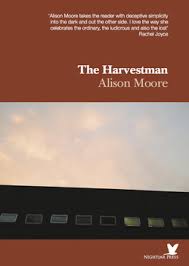 I recently read ‘The Harvestman’, the latest in Nightjar Press‘s ongoing series of standalone short stories, published as chapbooks. I’ve been an admirer of Alison Moore’s stories for years – she’s one of a breed of writers I have to list as my favourite, those whose fiction lurks disconsolately on the threshold of horror fiction, even sidling through the back door every once in a while but always fighting shy of becoming a fully paid-up member of the horror club. I thought Moore’s Booker-shortlisted debut, The Lighthouse, was pretty sensational, a masterclass in the short novel form so beloved of Ian McEwan (and way better than On Chesil Beach, in fact). More than that, it grows in the imagination, the kind of novel (less common than you might think) that will deliver an equal and in all likelihood greater measure of enjoyment on a second reading.
I recently read ‘The Harvestman’, the latest in Nightjar Press‘s ongoing series of standalone short stories, published as chapbooks. I’ve been an admirer of Alison Moore’s stories for years – she’s one of a breed of writers I have to list as my favourite, those whose fiction lurks disconsolately on the threshold of horror fiction, even sidling through the back door every once in a while but always fighting shy of becoming a fully paid-up member of the horror club. I thought Moore’s Booker-shortlisted debut, The Lighthouse, was pretty sensational, a masterclass in the short novel form so beloved of Ian McEwan (and way better than On Chesil Beach, in fact). More than that, it grows in the imagination, the kind of novel (less common than you might think) that will deliver an equal and in all likelihood greater measure of enjoyment on a second reading.
I have Moore’s second novel, He Wants, here on my shelf, and I’m looking forward to reading that, but I thought I’d sample ‘The Harvestman’ in the meantime, to whet my appetite. The story is only a few pages long, but it’s a beauty. During the short time it takes to read it, it is impossible not to become aware of how well made it is. The motifs – long-legged creatures that lurk in the shadows, broken legs, hammers, accidents, repeating patterns of injury, fires, unlucky escapes – are sewn artfully into the narrative like diamonds on velvet, each perfectly placed to maximise its refractive qualities. There is enough detail and insight, in these few thousand words, to make us feel we know the three main characters – Eliot, Abbey and Big Pete – well enough to recognise them on the street. And yet there is not a single extraneous detail in this story. Authorial control lies uppermost. You could even call ‘The Harvestman’ radically concise.
It occurred to me while I was reading ‘The Harvestman’ that when I say (as I frequently do) that I’m not actually very good at writing ‘real’ short stories, it’s stories like Moore’s that I’m thinking of: stories that fit naturally and comfortably into a few thousand words, stories whose imagery and action are tied together so perfectly that it feels as if one simply could not exist without the other, stories in which nothing happens that does not need to happen and where there are no untethered threads.
You frequently find people describing stories like this as being like jewels: worth more than its size might suggest and perfect from every angle. One of the most notable features of a story like ‘The Harvestman’ is that it has the marvellous natural alignment of a piece of found art, so right within its own skin you can’t imagine it any other way. Which of course belies the horrendous difficulty of writing a thing like that, the endless weighing and polishing to get those facets – the cut – just right.
One of the most important factors in developing your voice as a writer is discovering, by experimenting, by trial and error, in other words, what kind of writer you are. For me, the past couple of years have been about coming to understand that I am a naturally discursive writer, that I am obsessed with creating stories that ‘bag out’, that run off at tangents, and that my main task as this kind of writer is not to eliminate that tendency by streamlining my writing but to bring a sense of cohesion and logical progression to the various loose ends. To attach them to each other to make something that, while it is an intricate collation of minutiae, is also subject to an overarching order.
Rather like a spider’s web, I guess.
In her use of language and in particular the subject matter she chooses, I feel a great affinity with Alison Moore. I feel I understand instinctively why these stories were made, and even some of the how. I’m drawn to a character like Eliot immediately – I totally get that he’s afraid of harvestmen, which is why he notices every detail about them, and even, ironically, looks a little bit like one.
What I could never, ever do though is write his story in the way that Alison Moore has. She, unlike me, can write short stories. She is a master of the form.
Why not treat yourself and buy a copy of ‘The Harvestman’ here? And hurry – this is a limited edition of 200 copies, so they won’t hang about.